Eventi e attività
Eventi e attività di interesse per la comunità SICC.
Vuoi proporre al Consiglio Direttivo SICC un evento da promuovere? Scarica le regole per la sponsorizzazione.
Eventi e attività di interesse per la comunità SICC.
Vuoi proporre al Consiglio Direttivo SICC un evento da promuovere? Scarica le regole per la sponsorizzazione.
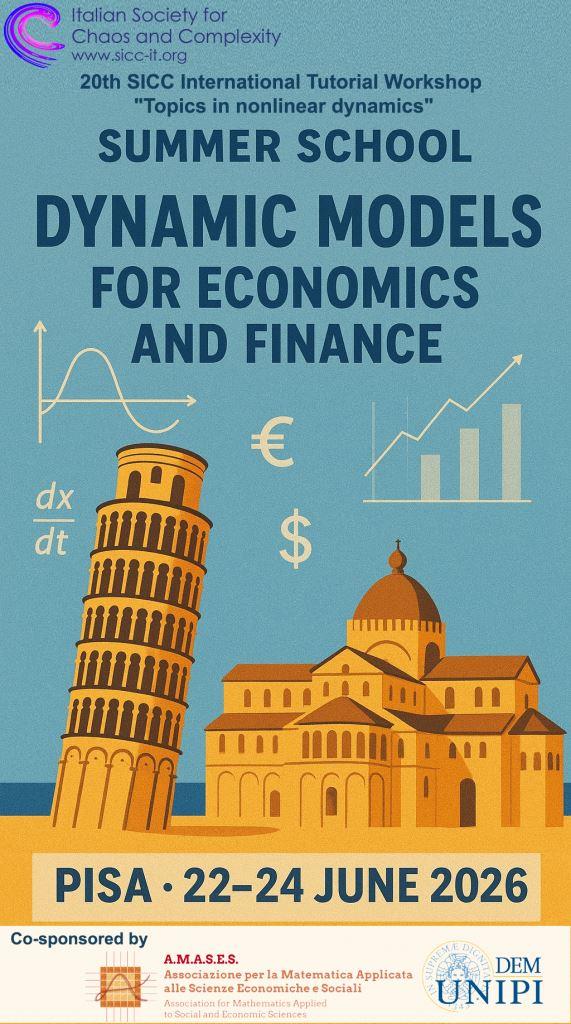
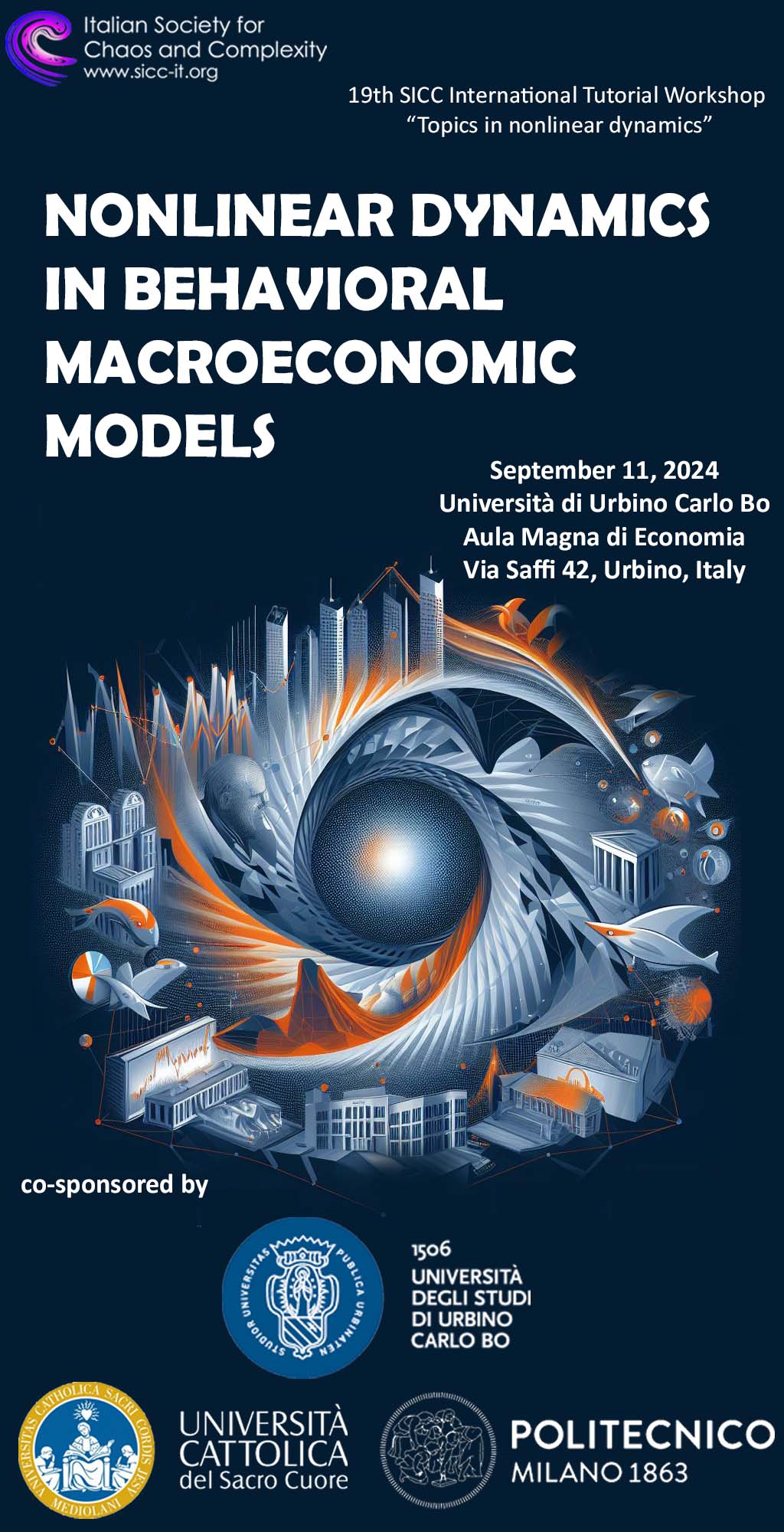
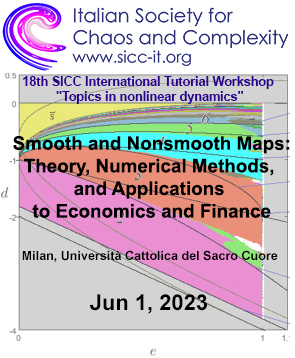
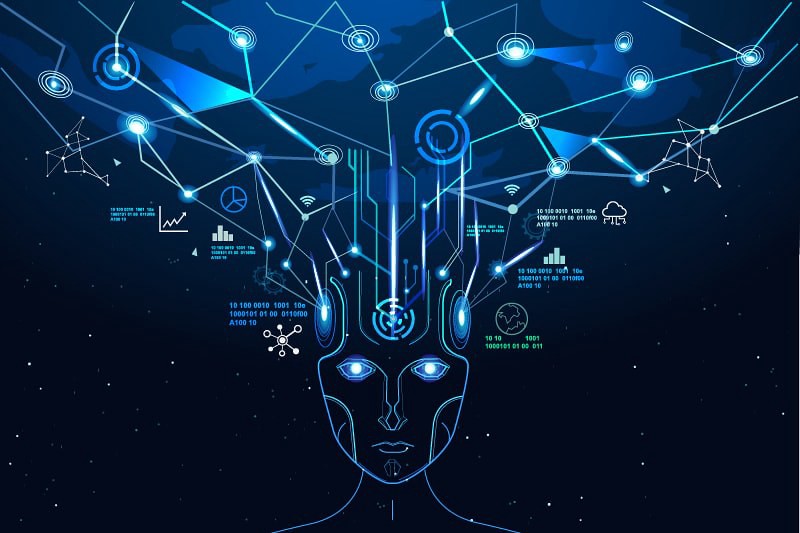



The Italian Society for Chaos and Complexity is proud to introduce the "SICC Talks on Complexity", a series of online lectures given in September-October 2020 on hot topics on complexity at large. Each seminar will be given by two prominent scholars and followed by a short debate and Q&A session. Upon (free) registration, participants will receive instructions on how to connect to attend the lecture.
Each year, the Italian Society for Chaos and Complexity organizes the SICC International Tutorial Workshop TOPICS IN NONLINEAR DYNAMICS, an event where PhD students, young researchers and leading speakers coming from diverse disciplines meet each other to spend a week talking about science, engineering and complexity. As this year we cannot meet in presence, the 15th edition of the yearly SICC workshop will take the form of a series of online lectures.

The workshop is the 13th of a series of tutorial workshops annually organized to explore the emergence of new research fields in which modeling, analysis and control of nonlinear and complex systems play a role of growing importance. These workshops have been traditionally devoted to an interdisciplinary audience with particular attention to PhD students and young researchers.
The theme of this year is “Complexity and The City” with a unique focus on interactions, mobility, epidemics, information and misinformation spreading, and many other complex phenomena typical of urban environments.
The workshop will gather scholars, students, and practitioners for two days of presentations and debates around complex systems science and its interplay with urban environments. A series of plenary lectures from renowned scholars is planned, while PhD students and young researchers will have dedicated sessions to present their research activity in an effective and appealing way. Social events will foster interaction and creation of collaboration opportunities.
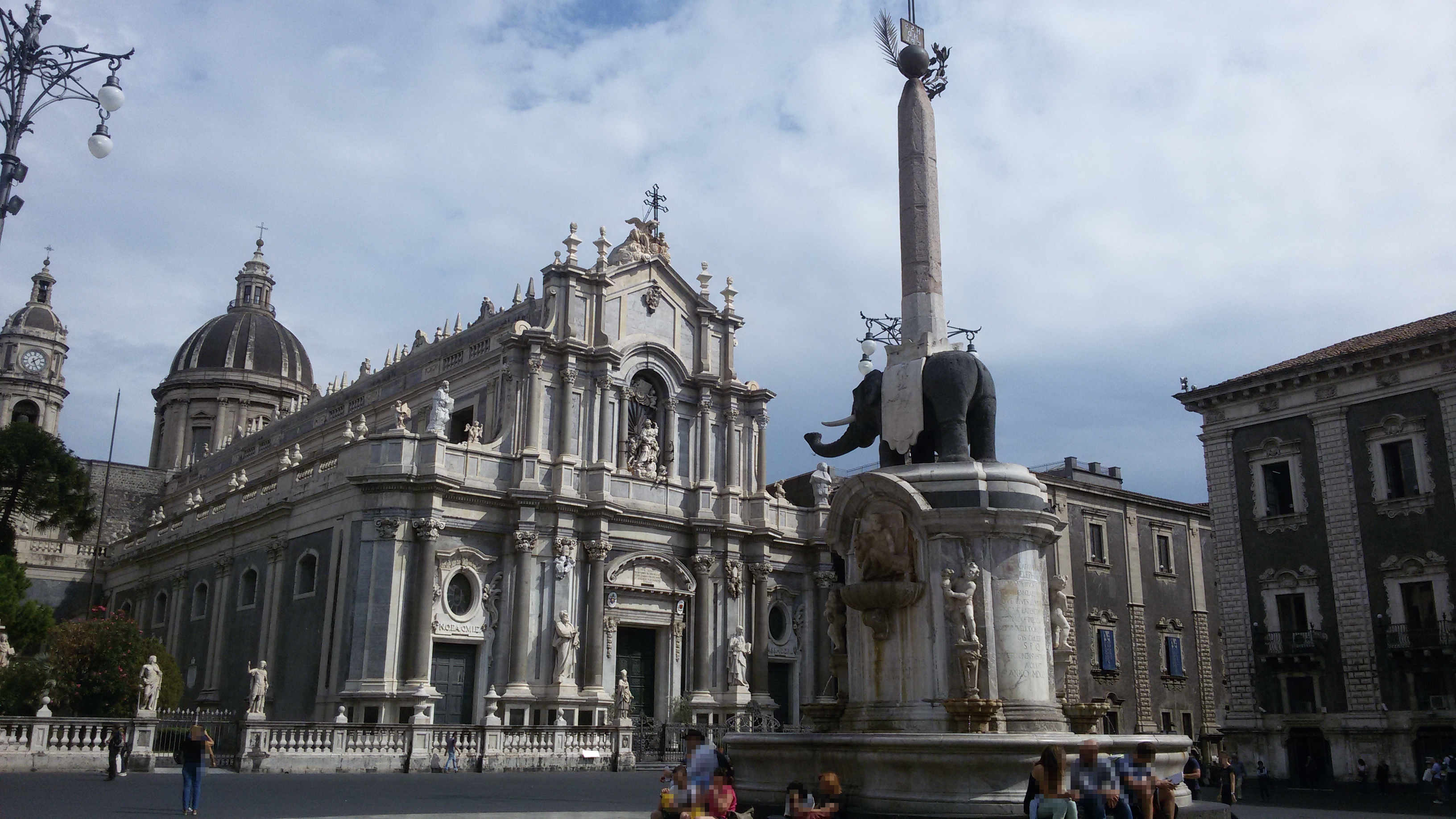
07/09/2017 - 08/09/2017
University of Catania, Catania (ITALY)
The 12th SICC International Tutorial Workshop “Topics in nonlinear dynamics”, organized by SICC and Department of Electrical, Electronics and Computer Science Engineering of the University of Catania, will be held from 7 September to 8 September 2017 at the University of Catania, Italy.

May 18-22, 2026 - Villa del Grumello, Como, Italy
Many real systems can be modeled as networks, where the elements of the system are nodes and interactions between elements are edges. An even larger set of systems can be modeled using dynamical processes on networks, which are in turn affected by the dynamics. Networks thus represent the backbone of many complex systems, and their theoretical and computational analysis makes it possible to gain insights into numerous applications. Networks permeate almost every conceivable discipline —including sociology, transportation, economics and finance, biology, and myriad others — and the study of “network science” has thus become a crucial component of modern scientific education.
The school “Complex Networks: Theory, Methods, and Applications” offers a succinct education in network science. It is open to all aspiring scholars in any area of science or engineering who wish to study networks of any kind (whether theoretical or applied), and it is especially addressed to doctoral students and young postdoctoral scholars. The aim of the school is to deepen into both theoretical developments and applications in targeted fields.
DEADLINE FOR APPLICATION: February 16, 2026 (firm deadline)
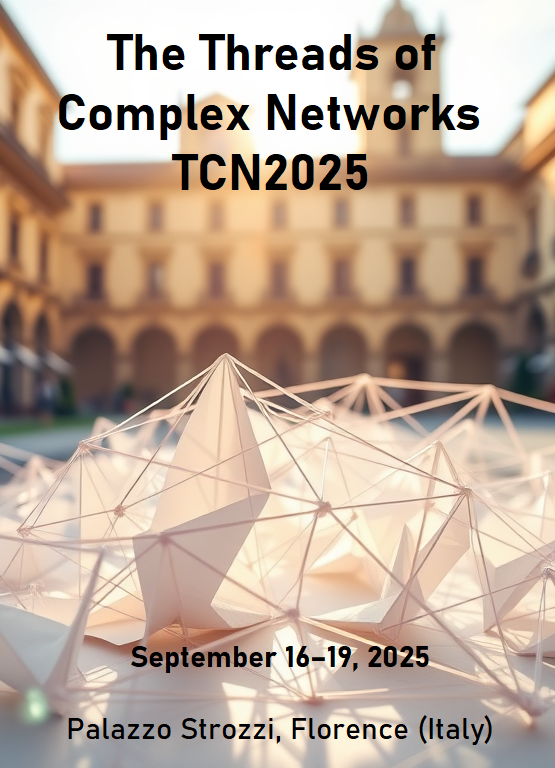
September 16-19, 2025 - Florence, Italy
The aim of the school is to present methodological, computational and machine learning methods for complex networks analysis, with applications spanning a wide range of fields.
The school will present a comprehensive view of the theoretical aspects of challenging topics in network theory, including higher order networks, diffusive models on networks, probabilistic and machine learning approaches, as well as computational methods. A wide range of applications will be explored during the lectures, including socio-economic and financial applications.
DEADLINE FOR APPLICATION: July 25, 2025

September 1-5, 2025 - Siena, Italy
The Conference on Complex Systems is the flag conference of the Complex Systems Society. It encompasses a diverse array of topics, featuring an extensive list that spans various facets of complexity. The main topics will include and are not restricted to, the following: foundations of Complex Systems, Social Systems, Cities and Tourism, Complex Networks, Economics and Finance, Climate, Data Science and AI, Cognition, Energy and Environment, Computation, Complexity in Biology, and Neuroscience, and various applications.
DEADLINE FOR ABSTRACT SUBMISSION: April 5, 2025 (firm deadline)

May 12-16, 2025 - Villa del Grumello, Como, Italy
Many real systems can be modeled as networks, where the elements of the system are nodes and interactions between elements are edges. An even larger set of systems can be modeled using dynamical processes on networks, which are in turn affected by the dynamics. Networks thus represent the backbone of many complex systems, and their theoretical and computational analysis makes it possible to gain insights into numerous applications. Networks permeate almost every conceivable discipline —including sociology, transportation, economics and finance, biology, and myriad others — and the study of “network science” has thus become a crucial component of modern scientific education.
The school “Complex Networks: Theory, Methods, and Applications” offers a succinct education in network science. It is open to all aspiring scholars in any area of science or engineering who wish to study networks of any kind (whether theoretical or applied), and it is especially addressed to doctoral students and young postdoctoral scholars. The aim of the school is to deepen into both theoretical developments and applications in targeted fields.
DEADLINE FOR APPLICATION: February 16, 2025 (firm deadline)

September 12-14, 2024, Urbino, Italy
MDEF is an international research network, created around a group of Italian researchers active since the Eighties of the last century, with the goal of adopting the language and the methodology of the modern qualitative theory of non linear dynamical systems to model and simulate the time evolution of economic, financial and social systems, characterized by complex behaviours and emerging properties resulting from nonlinear interactions, situations of disequilibrium, discontinuities and hysteresis.
Deadlines:
+ registration up to June 15, 2024
+ presentation of a 1-page Abstract deadline: July 31st
A selection of papers presented at MDEF 2024 can be submitted, after the conference in special issues of one of the following international journals; Decisions in Economics and Finance, Macroeconomic Dynamics, Energy Economics, Journal of Dynamics and Games
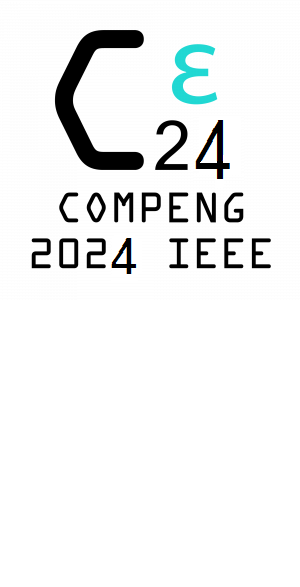
2024 IEEE WORKSHOP ON COMPLEXITY IN ENGINEERING
Florence, July 22-24,2024
COMPENG is a series of international workshops founded in 2010 aimed at providing a forum for experts and professionals working on the latest developments in complexity science and its application in an engineering perspective. The topics of the workshop round on complex systems and engineering, as Data and data-driven systems, Biophysics, Bio-inspired robotics and biomedical engineering, Complex systems and networks, Control in sensor and actuator networks, Communication and Transportation, Ecosystems and climate, Electronic and opto-electronic systems, Laser dynamics, nonlinear optics and opto-mechanics, Machine Learning, Neurotechnology and neuroscience, Nonlinear dynamics and stochastic processes, Smart grids, and Time-series analysis and modelling.
Wednesday 3rd of July 2024 - from 14:45 to 18:00
Energy Center Auditorium Politecnico di Torino
Via Paolo Borsellino 38/16 10138 Torino, ITALY
While being unable to store information, certain solid-state memristive nanodevices are blessed with the capability to act as sources of infinitesimal or local energy under appropriate bias conditions, similarly as the sodium and potassium ion channels in neuronal axon membranes. Memristors of this kind stand out as ideal candidates to build energy-efficient brain-inspired computing machines in the years to come. Very recently memristive devices of this kind have been employed to design simple circuits, which capture bifurcation phenomena occurring in physical systems, including reaction-diffusion systems from cellular biology and neuronal axon membranes, through half the number of dynamical states. Moreover, several scientists have recently revealed how certain electronic circuits and systems, they recently designed, achieve peak performance, while operating at the Edge of Chaos. These studies clearly motivate further theoretical and experimental research on the principles of
Local Activity and Edge of Chaos.
This workshop, taking place at the Energy Center Auditorium (see map), sponsored by the Italian Society for Chaos and Complexity (SICC), and organized within the Long-Term Visiting Professor Programme, established by Politecnico di Torino, and providing us with the privilege to host Prof. R.S. Williams at the Department of Electronics and Telecommunications, intends to highlight the major role, which locally-active nanodevices shall play in bio-inspired electronics in the years to come.
Program:
14:45-15:00 Rector Prof. Stefano Paolo Corgnati, Welcome address
15:00-16:00 R. Stanley Williams, “Brain-Inspired Computing with Nonlinear Dynamical Materials” Department of Electrical and Computer Engineering, Texas A&M University, USA
16:00-16:30 Coffee break
16:30-17:00 Gianluca Milano, “Unconventional computing with nanowire networks” Advanced Materials Metrology and Life Sciences Division, INRiM (Istituto Nazionale di Ricerca Metrologica), Torino, Italy
17:00-17:30 Alon Ascoli, “The Simplest Ever Reported Bio-Inspired Circuit Supporting the Same Three-Bifurcation Cascade Emerging in the Hodgkin-Huxley Neuron” Department of Electronics and Telecommunications, Politecnico di Torino, Italy
17:30-17:50 Fernando Corinto, “Computing with Resistive Networks” Department of Electronics and Telecommunications, Politecnico di Torino, Italy
17:50-18:00 Closing
The event is open to all professors, researchers and students. Participation to the Colloquium is free of charge but registration is welcome by sending a message with subject “Colloquium – Brain-Inspired Computing” to Questo indirizzo email è protetto dagli spambots. È necessario abilitare JavaScript per vederlo. and/or Questo indirizzo email è protetto dagli spambots. È necessario abilitare JavaScript per vederlo.. For further information please contact Questo indirizzo email è protetto dagli spambots. È necessario abilitare JavaScript per vederlo. and/or Questo indirizzo email è protetto dagli spambots. È necessario abilitare JavaScript per vederlo..

5-7 June 2024
London, UK.
The conference is the 7th IFAC meeting related to analysis and control of chaotic systems. The 2024 edition aims at expanding the scope of the conference to not only include contributions in the traditional IFAC CHAOS area but also those contributions regarding complexity, complex systems and nonlinear dynamics which have a strong mathematical and physical flavour. The conference will collect the most prominent and timely contributions in the interdisciplinary field of chaos, nonlinear dynamics control and synchronization, including the complex networks scenario. The aim of the conference is to provide the communities of control engineering, physics, economics, biology, fluid dynamics, power electronics, electronic circuits, etc. with an opportunity to exchange information and new ideas and to discuss new developments in the field of chaos control and synchronization.
Important dates:
• Submission (contributed and invited papers) deadline: November 8, 2023
• Invited session proposals deadline: November 1, 2023
• Acceptance decision: February 2024
• Final submission deadline: March 2024

May 27-31, 2024 - Villa del Grumello, Como, Italy
Many real systems can be modeled as networks, where the elements of the system are nodes and interactions between elements are edges. An even larger set of systems can be modeled using dynamical processes on networks, which are in turn affected by the dynamics. Networks thus represent the backbone of many complex systems, and their theoretical and computational analysis makes it possible to gain insights into numerous applications. Networks permeate almost every conceivable discipline —including sociology, transportation, economics and finance, biology, and myriad others — and the study of “network science” has thus become a crucial component of modern scientific education.
The school “Complex Networks: Theory, Methods, and Applications” offers a succinct education in network science. It is open to all aspiring scholars in any area of science or engineering who wish to study networks of any kind (whether theoretical or applied), and it is especially addressed to doctoral students and young postdoctoral scholars. The aim of the school is to deepen into both theoretical developments and applications in targeted fields.
DEADLINE FOR APPLICATION: February 25, 2024 (firm deadline)

Udine, Italy. November 20-24, 2023.
Delays and structures pervade the realistic modeling of populations and their investigation under the paradigm of dynamical systems.
They prove to be essential also in control and related fields, where modeling through delay functional or partial differential equations has become increasingly fundamental.
The inclusion of past history in the time evolution and the introduction of structuring variables add non-trivial complexities with respect to ordinary systems, balancing the undoubted advantage of dealing with more realistic models. Equations involving time delays and structures both generate dynamical systems of infinite dimension, asking for advanced methods in the mathematical analysis and the numerical treatment. Finally, understanding stability of equilibria and other invariants is crucial and often requires sophisticated numerical and computational approaches. The school brings together strong and up-to-date contributions in population dynamics and related fields as far as delays and structures give fundamental tools for the realistic modeling of, e.g., the transmission of an infectious disease, the evolution of a resource-consumer scenario or the competition in a predator-prey system. Numerical and computational expertise is also offered, providing reliable approaches towards a practical and accessible analysis. The course aims at discussing the most recent advances in the different contexts of the relevant mathematical analysis (functional aspects of semigroup theory); the concerned modeling approaches (delay differential, renewal and partial differential equations of evolution type, including multi-structured, neutral and state-dependent equations); the numerical and computational techniques to operate with infinite-dimensional dynamical systems (simulation, stability, bifurcation).

9-11 Nobember 2023
Politecnico di Torino, Turin, Italy.
ECCTD 2023 will provide a forum to share and discuss recent trends and advances in circuit design methodologies and electronic hardware implementation of unconventional computing systems and groundbreaking algorithms for artificial intelligence applications. The conference consists of plenary lectures, regular and special sessions.
Registration in open.
Abstract submission closes on August 21st.

5-9 Nobember 2023
Politecnico di Torino, Turin, Italy.
Memristor technologies, including memristive, memcapacitive, and meminductive nanodevices, are expected to enable a revolutionary shift in the way electronic systems process information, extending the capabilities of state-of-the-art purely-CMOS computing machines, and resolving their performance limitations, so as to foster progress in integrated circuit design beyond the Moore era. MEMRISYS 2023 will provide a forum to share and discuss the current state-of-the-art development process of memristor technologies.
Registration in open.
Abstract submission closes on May 31st.

9-11 October 2023
Università degli studi di Napoli Federico II, Naples, Italy.
The conference main theme is Complexity and Risk. The conference will consist of keynote lectures delivered by experts in several scientific areas, contributed talks and public lectures on the main conference themes. Conference participants who would like to give a talk are kindly asked to send an abstract.
Registration in open.
Abstract submission closes on August 31st.

26-29 September 2023
Catania, Italy
The 2023 International Symposium on Nonlinear Theory and Its Applications (NOLTA2023) will be held at Cittadella Campus of the University of Catania, Catania, Italy, Sep. 26–29, 2023. The objective of the symposium is to provide a forum for exchange of the latest results related to nonlinear theory and its applications. Papers describing original results in all aspects of nonlinear theory and its applications are invited. Topics include, but are not limited to: Nonlinear Theory in Science and Engineering, Nonlinear Phenomena in Science and Engineering, Mathematical and Numerical Methods, Interdisciplinary Fields, and Applications in Science and Engineering.
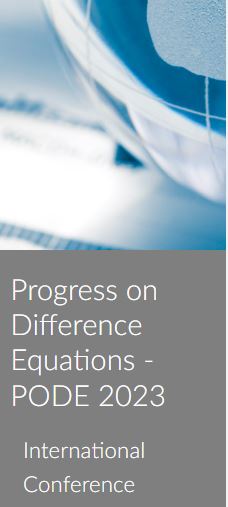
29th – 31th May 2023
Università Cattolica del Sacro Cuore, Largo A. Gemelli, 1 - Milano, Italy
The conference aims to gather together both junior and senior researchers around the world to exchange new ideas and the latest developments in their research difference equations and their applications to economics, social sciences, engineering, physics, chemistry and biology.
Registration opens on 1st December 2022. Researchers, scholars, practitioners and students are invited to submit abstracts by 15th March 2023.

Many real systems can be modeled as networks, where the elements of the system are nodes and interactions between elements are edges. An even larger set of systems can be modeled using dynamical processes on networks, which are in turn affected by the dynamics. Networks thus represent the backbone of many complex systems, and their theoretical and computational analysis makes it possible to gain insights into numerous applications. Networks permeate almost every conceivable discipline —including sociology, transportation, economics and finance, biology, and myriad others — and the study of “network science” has thus become a crucial component of modern scientific education.
The school “Complex Networks: Theory, Methods, and Applications” offers a succinct education in network science. It is open to all aspiring scholars in any area of science or engineering who wish to study networks of any kind (whether theoretical or applied), and it is especially addressed to doctoral students and young postdoctoral scholars. The aim of the school is to deepen into both theoretical developments and applications in targeted fields.
DEADLINE FOR APPLICATION: February 26, 2023 (firm deadline)

3-8 September 2023
Naples, Italy
Dynamics Days Europe is a series of major international conferences founded in the 1980's that provides a European forum for developments in the theory and applications of dynamics. For more than 40 years, it has been bringing together researchers from a wide range of backgrounds including physics, mathematics, biology, and engineering for interdisciplinary research in nonlinear science. Topics of interest include: Astrophysics, Asymptotics, Bifurcation Theory, Biophysics, Chaos, Chemical dynamics, Complex systems and Networks, Computational Methods, Control systems, Crowd Dynamics and Mobility, Earthquake engineering, Econophysics, Environmental dynamics and Ecology, Epidemics, Financial systems, Fluid and Solid Mechanics, Machine and Deep Learning, Materials Science, Mathematical Physics, Multiscale Dynamics, Multi-physics, Neurodynamics, Numerical Analysis, Pattern Formation, Reduced-order Modelling, Robotic dynamics, Self-organized systems, Scientific Computing, Soft Matter, Social dynamics and networks, Statistical Physics, Stochastic Systems, Time Series Analysis, Traffic dynamics, Turbulence.
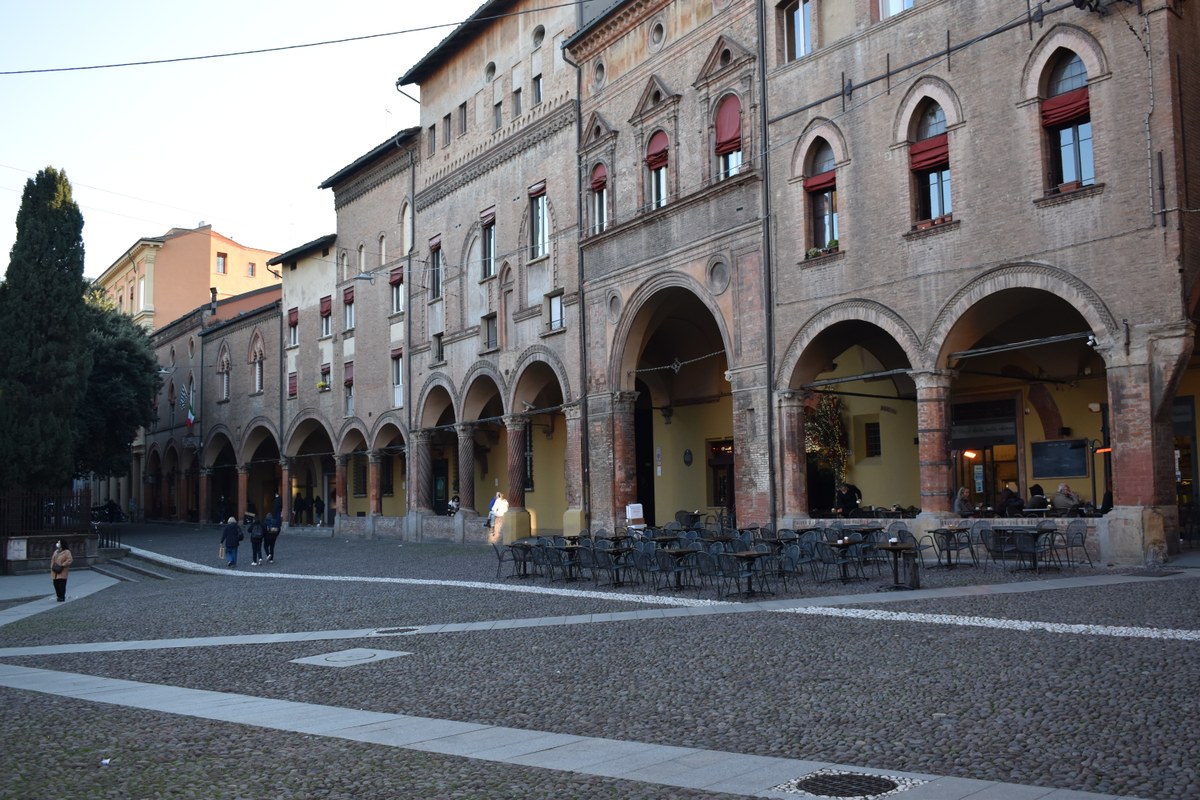
The 1st IFAC Workshop on Control of Complex Systems (COSY 2022) will be held Thursday to Friday, November 24-25, 2022 in Bologna, Italy.
COSY 2022 aims to be the first of a series of IFAC Workshops on Control of Complex Systems. The workshop will gather academics and professionals from the control community who share the interest for complex systems, offering them a forum where to discuss current research developments, open problems, emerging structural properties and methodologies.
The main focus of the workshop is on the study of structural properties of systems which consist of the interconnection of a number of subsystems and which are characterized by the complexity due to one or more of the following features: lack of knowledge about the system dynamics; perturbations, disturbances and changes of the external demand; uncertainty of the interconnection topology; hybrid or heterogeneous nature of the sub-processes; structural adaptation to moving goals; variable environment; large dimensionality; constrained variables and communication constraints. Examples of complex systems are evolving systems, switching systems, impulsive systems, networks of agents, and, more generally, systems of systems and cyber-physical systems. Applications are found in modelling and control of natural processes (e.g., in biology and genetics), social sciences dynamics (e.g., in community networks studies) and man-made processes (e.g., in engineering design, manufacturing, networks and communications, power distribution, management).
Submissions to COSY 2022 are solicited in the form of contributed papers and invited tracks/sessions (through IFAC Papercept submission system). The submission deadline for invited track/session proposals is May 15, 2022. The submission deadline for contributed papers and invited papers is May 31, 2022.

CONFERENCE ON COMPLEX SYSTEMS (CCS) SATELLITE MEETING
October, 19 2022, PALMA DE MALLORCA
HYBRID SATELLITE
The scope of this event is therefore to push the research on the cutting-edge problem of applying neural network techniques to the interpretation of complex systems’ dynamics, with a particular focus on real world applications. Specifically, we intend to stimulate the discussion on several actual and decisive topics, ranging from the evolution of physical ecosystems to the study of biological systems’ interactions (for example, in the human immune system, for genome-transcriptome-proteome data), from the analysis of communications to social networks and human behavior. From a more theoretical point of view, we would like to discuss the recent developments in the mathematical theory and application of networks and networked dynamical processes, where the interactions among nodes cannot be decomposed into pairwise interactions. Applications of such approaches include analyzing persistent homology structure of data represented by higher-order networks, and uncovering new collective behavior and synchronization patterns that emerge from higher-order interactions. At the same time, multi-layer and modular networks have also found their applications in modeling biological and artificial neural networks and in addressing questions like how network structures affect collective behavior.
In this satellite, we are inviting researchers, many of whom have worked on both machine learning and complex systems. The goal is to bring together the scientists having expertise in traditional approaches in studying complex systems and networks and expert machine learning scientists for exchange of ideas, and formation of a platform for future collaboration, as well as to deliberate upon open problems in the complex systems and network science which can be addressed by machine learning techniques.
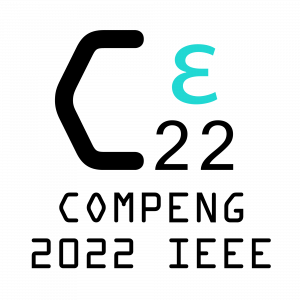
2022 IEEE WORKSHOP ON COMPLEXITY IN ENGINEERING
Florence, July 18-20,2022
COMPENG is a series of international workshops founded in 2010 aimed at providing a forum for experts and professionals working on the latest developments in complexity science and its application in an engineering perspective. The topics of the workshop round on complex systems and engineering, as Data and data-driven systems, Biophysics, Bio-inspired robotics and biomedical engineering, Complex systems and networks, Control in sensor and actuator networks, Communication and Transportation, Ecosystems and climate, Electronic and opto-electronic systems, Laser dynamics, nonlinear optics and opto-mechanics, Machine Learning, Neurotechnology and neuroscience, Nonlinear dynamics and stochastic processes, Smart grids, and Time-series analysis and modelling.

Many real systems can be modeled as networks, where the elements of the system are nodes and interactions between elements are edges. An even larger set of systems can be modeled using dynamical processes on networks, which are in turn affected by the dynamics. Networks thus represent the backbone of many complex systems, and their theoretical and computational analysis makes it possible to gain insights into numerous applications. Networks permeate almost every conceivable discipline —including sociology, transportation, economics and finance, biology, and myriad others — and the study of “network science” has thus become a crucial component of modern scientific education.
The school “Complex Networks: Theory, Methods, and Applications” offers a succinct education in network science. It is open to all aspiring scholars in any area of science or engineering who wish to study networks of any kind (whether theoretical or applied), and it is especially addressed to doctoral students and young postdoctoral scholars. The aim of the school is to deepen into both theoretical developments and applications in targeted fields.
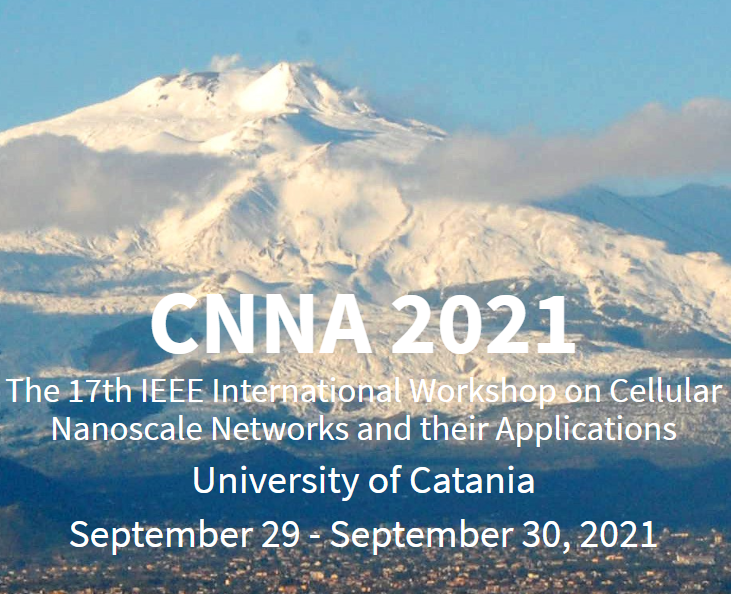
The 17th IEEE International Workshop on Cellular Nanoscale Networks and their Applications, University of Catania - September 29 - September 30, 2021.
Computer technology is rapidly changing in the last decades. Besides the general progression in multi-core and many-core designs there is a strong demand for emerging nano-scale technologies with low power dissipation, intelligent, bio-inspired machines, massively-parallel architectures with learning capabilities, and memristive systems. Moreover, sensing and analyzing the visual world requires special sensors and processors. Sensor-processor arrays can solve problems from early image processing up to decision making. CNNA 2021 will provide a forum for the presentation of latest results and exploration of future directions in the context of Cellular Nanoscale Networks and their Applications.

The 6th IFAC Conference on Analysis and Control of Chaotic Systems will be held in Catania, September 27 - September 29, 2021.
The conference will be hybrid, allowing virtual and on-site presentations.
The conference is the sixth IFAC meeting related to analysis and control of chaotic systems. The 2021 edition aims at collecting the most prominent and timely contributions in the interdisciplinary field of chaos and nonlinear dynamics control and synchronization, including the complex networks scenario. Several research areas lean on this field, taking advantage from new developments. Biology (brain dynamics, heart beating, human-machine interaction etc.), physics (optics, magnetics, fluidics and microfluidics, etc.), mechanics and electro-mechanics, engineering (nonlinear dynamics of electronic and power electronic circuits and systems, chaos encryption, robotics, etc.), economics (critical decision, data-series analysis etc.), chemical engineering, and so on. Both theory and applications will be discussed. The conference aims also at directly involving students and young researchers in order to introduce them to the field of chaos and nonlinear dynamics.
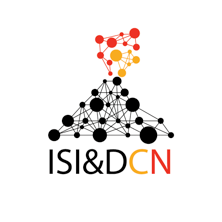

Udine, Italy. November 25-29, 2019.
Delays are ubiquitous in engineering and natural sciences, e.g., communication delays in control devices and complex networks or maturation and gestation delays in population dynamics. The inclusion of past history in the time evolution adds nontrivial complexities with respect to ordinary systems, balancing the advantage of dealing with more realistic models. Equations involving delays generate dynamical systems of infinite dimension, asking for advanced tools and methods in the background mathematical analysis, the numerical treatment, the development, design and optimization of control strategies. Eventually, the comprehension of fundamental issues like stability of equilibria and other invariants is crucial, especially for varying or uncertain parameters.
The school brings together strong and up-to-date contributions in the field of time delay systems, concerning analytical, numerical and application aspects, under the paradigm of control theory. It aims at discussing the most recent advances in these different contexts, focusing also on their interdisciplinary connections. Analysis, methods, control strategies and applications will be illustrated, starting from rapid introductions of the basics, reaching a state-of-the-art level by evolving the classic approaches into modern perspectives.

The International Workshop on Network Models in Statistics, Economics and Social Sciences, jointly organized by the Department of Statistics and Quantitative Methods (Università di Milano - Bicocca) and the Department of Mathematics for Economic, Financial and Actuarial Sciences (Università Cattolica del Sacro Cuore), will be held in Milan, on the 14 and 15 of November, 2019.
The aim of the workshop is to gather ongoing research on network models, algorithms and applications in the fields of Statistics, Economics, Finance, Political and Social Sciences.

The 9th International Scientific Conference on Physics and Control (PhysCon 2019) will be held from 8th to 11th July 2019 in Saratov, Russia. The conference will focus on the borderland between Physics and Control with emphasis on both theory and applications. Topics will include (but not limited to) Nonlinear dynamics, Controlled systems in physics, Dynamics and control of complex networks, Self-organization and complexity, Micro and nano-technologies, Control in thermodynamics, Communication and transportation, Environmental and earth sciences, Control of ecosystems and climate, Mathematical physics, Chemical process control, Social networks and policies, Biology and medicine applications, and Engineering systems and design.

The European Control Conference (ECC) has been organized every two years under the auspices of the European Control Association (EUCA).
The conference aims to bring together academic and industrial professionals in the field of systems and control, and to promote scientific cooperation and exchanges within the European Union and between Europe and other parts of the World.
ECC19 is the 17th in the EUCA Series of European Control Conferences and will be held in Italy, Naples from June 25 to June 28, 2019.

Many real systems can be modeled as networks, where the elements of the system are nodes and interactions between elements are edges. An even larger set of systems can be modeled using dynamical processes on networks, which are in turn affected by the dynamics. Networks thus represent the backbone of many complex systems, and their theoretical and computational analysis makes it possible to gain insights into numerous applications. Networks permeate almost every conceivable discipline —including sociology, transportation, economics and finance, biology, and myriad others — and the study of “network science” has thus become a crucial component of modern scientific education.
The school “Complex Networks: Theory, Methods, and Applications” offers a succinct education in network science. It is open to all aspiring scholars in any area of science or engineering who wish to study networks of any kind (whether theoretical or applied), and it is especially addressed to doctoral students and young postdoctoral scholars. The aim of the school is to deepen into both theoretical developments and applications in targeted fields.


2018 WORKSHOP ON COMPLEXITY IN ENGINEERING
10/10/2018 - 12/10/2018 Galileo Galilei Institute for Theoretical Physics,
Firenze (ITALY)
COMPENG 2018 is a workshop organized by the National Institute of Optics (CNR-INO), the Institute of Complex Systems (CNR-ISC), the University of Florence and the National Institute of Nuclear Physics (Florence) in cooperation with the IEEE Italy Section.
Deadline for abstract/paper submission: 31/05/2018

The 2018 International Symposium on Nonlinear Theory and Its Applications (NOLTA2018) will be held at Palau de Congressos de Tarragona, Tarragona, Spain, Sep. 2–6, 2018. The objective of the symposium is to provide a forum for exchange of the latest results related to nonlinear theory and its applications. Papers describing original results in all aspects of nonlinear theory and its applications are invited.

11/06/2018 - 13/06/2018
Library and Pinacotheca Zelantea, Acireale
(Catania, ITALY)
The 26th Nonlinear Dynamics of Electronic Systems conference will be held in Acireale, a baroque town nearby Catania, 11-13 June 2018.
The NDES 2018 main theme is: "Nonlinear technologies for network and distributed systems control".
The conference will consist of plenary and parallel sessions providing the most recent results in nonlinear dynamics of circuits and systems highlighting their interdisciplinary applications.

The school “Complex Networks: Theory, Methods, and Applications” offers a succinct education in network science. It is open to all aspiring scholars in any area of science or engineering who wish to study networks of any kind (whether theoretical or applied), and it is especially addressed to doctoral students and young postdoctoral scholars.

4/09/2017 - 06/09/2017
Università di Catania, Catania (ITALY)
The ECCTD 2017 is organized by the Electric, Electronics and Computer Engineering Department of the University of Catania. The conference consists of plenary lectures, regular, special and poster sessions focusing on recent trends and advances in circuit design, including but not limited to:
CIRCUITS
SYSTEMS
MATHEMATICAL AND COMPUTATIONAL METHODS
NANOSCALE DEVICES & CIRCUITS
NEUROMORPHIC & BIOMEDICAL CIRCUITS
CONTROL OF COMPLEX NETWORKS
SIGNAL PROCESSING APPLICATIONS

17/07/2017 - 19/07/2017
Istituto Nazionale di Ottica - CNR, Firenze (ITALY)
PhysCon2017 is the eighth conference in a series started in Saint Petersburg, Russia. PhysCon2017, like the other PhysCons, will focus on the borderland between Physics and Control with emphasis on both theory and applications.

15/05/2017 - 19/05/2017
Villa del Grumello, Como (ITALY)
The school “Complex Networks: Theory, Methods, and Applications” offers a succinct education in network science. It is open to all aspiring scholars in any area of science or engineering who wish to study networks of any kind (whether theoretical or applied), and it is especially addressed to doctoral students and young postdoctoral scholars.
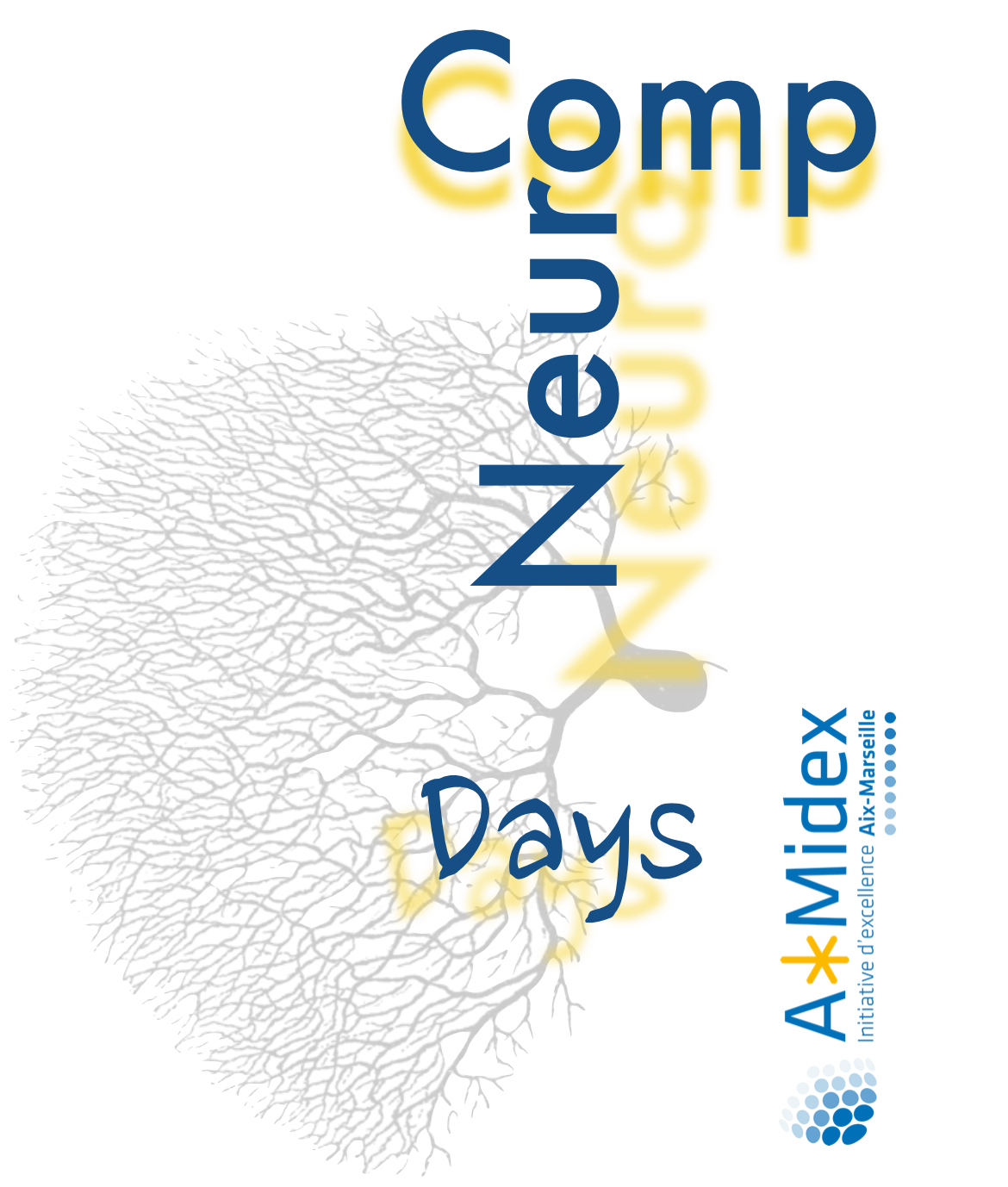
Workshop on Computational Neuroscience in Marseille (France)
The aim of this workshop is to gather researchers active in the field of general computational neuroscience to illustrate the diversity of its approaches and the richness of cooperation between theorists and experimentalists, and all this in an informal atmosphere favorable to discussions, opened to PhD students.
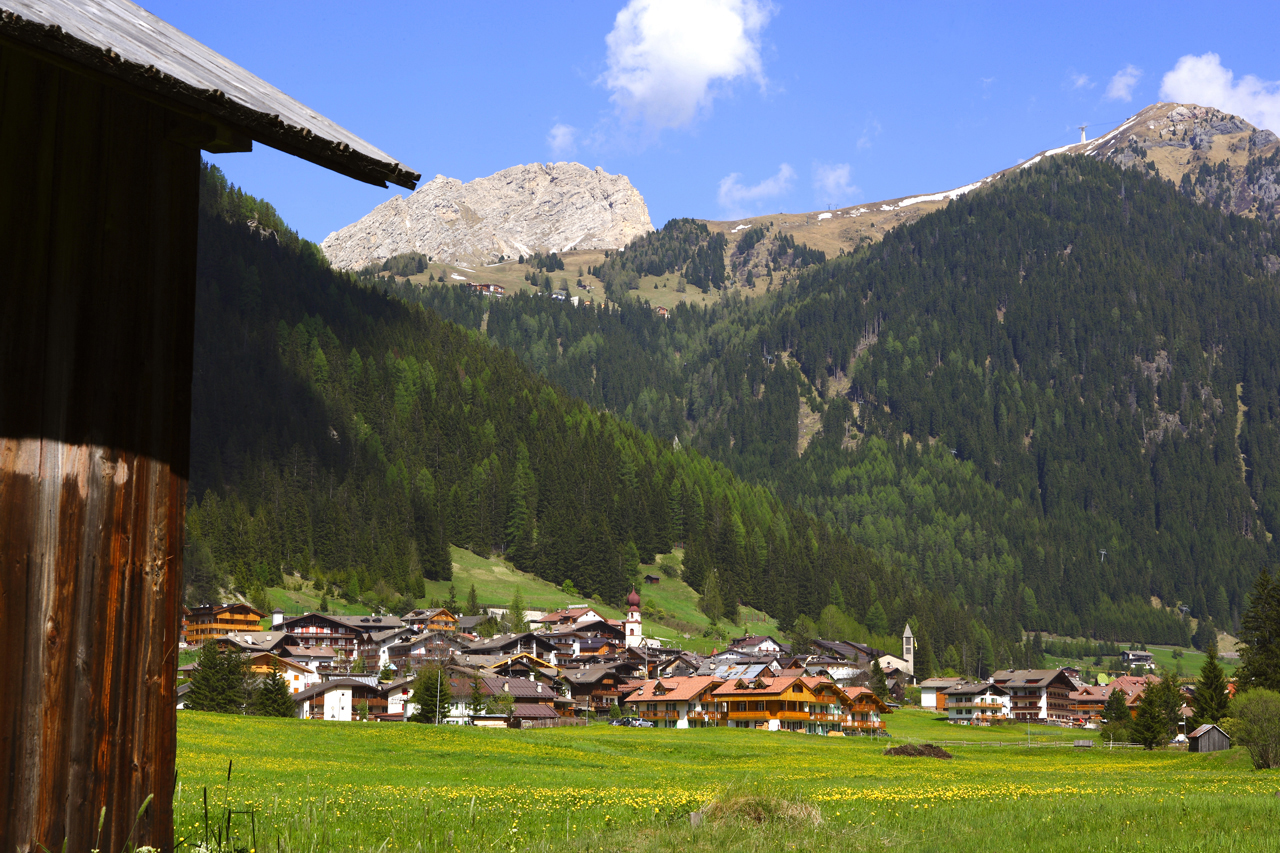
17/07/2017 - 21/07/2017
Alba di Canazei - Trento (ITALY)
Starting from basic notions of linear algebra and calculus the course will provide a description of the structure and properties of several nonlinear economic, financial and social systems evolving with time as well as qualitative properties, such as existence of equilibrium situations, stability and bifurcations, as well as the occurrence of deterministic chaos.